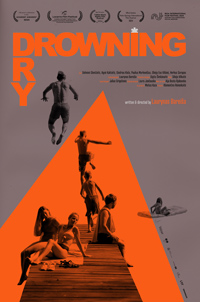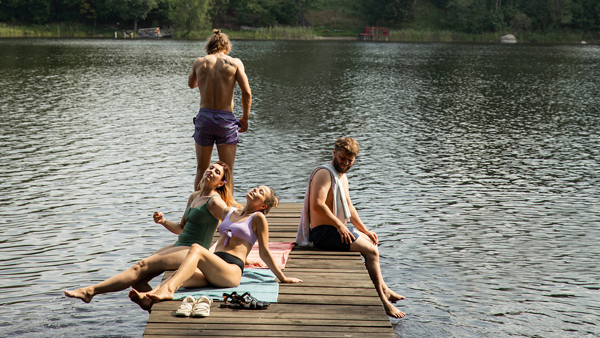Dry Spell: Bareiša Explores Trauma in the Abstract
 Repetitive patterns once again provide the narrative parameters reinforcing oblique happenings for Lithuanian director Laurynas Bareiša in his sophomore film, Drowning Dry. A reference to a highly debated non-medical term in which the absence of water in the lungs suggests death occurred before a liquid submersion, Bareiša attempts to construct a family’s tragedy through the fracturing processes of trauma, and thereby suggesting they’re already doomed by the time we’re even introduced to them. There’s also a major subtext on gendered roles and masculine posturing which ultimately catalyze two major events which prove to have irreconcilable consequences. Even more so than his celebrated previous feature, 2021’s Pilgrims, Bareiša’s latest is an esoteric exercise on delayed reactions, both mentally and physically, with a quietly grim film which suggests the only inevitability in life is moving forward.
Repetitive patterns once again provide the narrative parameters reinforcing oblique happenings for Lithuanian director Laurynas Bareiša in his sophomore film, Drowning Dry. A reference to a highly debated non-medical term in which the absence of water in the lungs suggests death occurred before a liquid submersion, Bareiša attempts to construct a family’s tragedy through the fracturing processes of trauma, and thereby suggesting they’re already doomed by the time we’re even introduced to them. There’s also a major subtext on gendered roles and masculine posturing which ultimately catalyze two major events which prove to have irreconcilable consequences. Even more so than his celebrated previous feature, 2021’s Pilgrims, Bareiša’s latest is an esoteric exercise on delayed reactions, both mentally and physically, with a quietly grim film which suggests the only inevitability in life is moving forward.
Lukas (Paulius Markevicius) has just won his latest martial arts tournament, which seems to be the impetus for he and his wife Ernesta (Gelmine Glemzaite) in joining her sister Juste (Agne Kaktaite) and husband Tomasz (Giedrius Kiela) at a remote family cabin. Lukas’ victory seems to eclipse the other reason for the holiday—-Tomasz’s birthday. With each couples’ preadolescent children in tow, they seem to share an affable camaraderie. But when Tomasz haphazardly tosses his daughter Urte into the lake and she nearly drowns, the trajectory of both families (and the narrative of the film) goes haywire.

There’s a detached austerity to Drowning Dry, which heightens the sense of anxiety through observing endless stretches of banalities speckled with moments of frustrating behavioral tics, mostly between the men, who seem to be competing for a sense of dominance. Lukas is clearly fashioned as a superior specimen, but his desire to engage in a public spectacle of it troubles his wife, who sobs during his early victory at the tournament, partially out of relief and frustration. His prowess clearly affects the behavior of Tomasz, who seems to want to prove his masculine capabilities through adolescent means. This, of course, leads to the playful act which creates a trajectory of trauma when he tosses his daughter into the lake.
Nearly the first forty minutes of the film are a linear trajectory leading up to this moment, before Bareiša retreats into repetitions and fractures, as if we’re reliving the memory of this moment through different participants and he doesn’t want to make it clear from which source. The sisters dance to Donna Lewis in the first rendition, but then the same moment is later set to the Lighthouse Family, with both sisters dancing the same way. On the second reenactment, we see Urte is eventually saved, only to experience trouble breathing later in the same evening, necessitating a trip to a medic. And then the narrative jumps forward to showcase Juste and Ernesta as single women, backtracking to the actual tragedy which would dissolve both of their relationships.
By the final credits, Drowning Dry conjures an essence of instability and displacement, but it’s ultimately unclear what we’re meant to feel for Juste and Ernesta other than a sense of determined finality. There is a sense of patriarchal tendencies undermining stability, and how a ‘defective’ male figure proves to be ruinous, a la Julia Loktev’s The Loneliest Planet (2011) or Ruben Ostlund’s Force Majeure (2014). But there’s no emotional examination, leading us to feel as severed from these characters as they eventually seem to be amongst themselves.
Reviewed on August 10th, 2024 – at the 77th edition of the Locarno Film Festival — Concorso Internazionale section. 90 Mins
★★★/☆☆☆☆☆


